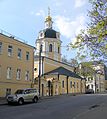Karl Blank
Karl Blank | |
|---|---|
 Moscow Orphanage | |
| Born | 1728 |
| Died | 1793 |
| Nationality | Russian |
| Occupation | Architect |
| Buildings | Baroque churches in Moscow |
| Projects | Moscow Orphanage |
Karl Ivanovich Blank (Russian: Карл Иванович Бланк; 1728 – 1793) was a Russian architect, notable as one of the last practitioners of Baroque architecture and the first Moscow architect to build early neoclassical buildings. His surviving, undisputed legacy consists of three baroque churches and Moscow Orphanage. The Ukrainian palace of Kachanivka is also attributed to him.
Biography
Blank's ancestors were French
Karl Blank and Alexander Kokorinov joined state construction crews led by
His own early designs, like the completed Annenhof palace in
-
St. Nicholas church, Rozhdestvenka Street
-
St. Catherine church,Zamoskvorechye
-
Trinity church byYauza River
From 1764 to 1781, Blank built his largest project, Moscow Orphanage, designed to house 8,000 resident children and staff. Only two thirds of his original plan were completed; the eastern wing was added only in 1940s. The Orphanage is believed to be Moscow's first neoclassical building, and is surely the earliest extant example of the style, retaining most of original exterior. The Orphanage earned him a reputation of a manager who could handle the largest projects of his time; at the same time its austere looks scared off the customers. Soon after acquiring the Kremlin Senate commission in 1775, Blank was stripped from the job (the Senate was redesigned and completed by Matvey Kazakov); his third large work for the state, Catherine's Institute in Meshchansky District of Moscow, burnt down in 1812.[citation needed]
In the 1780s, Blank quit independent construction management and became a consultant in landscaping and interior design; his advice was sought after by the wealthiest nobles. Notably, he consulted count
Blank had five children; among his descendants are Nikolay Basargin, a convicted
References
- Russian: Biography
- Russian: Disputed design: Trinity church in Zheleznodorozhny



